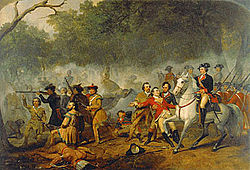French and Indian War

The French and Indian War (1754-1763) was the American extension of the general European conflict known as the Seven Years' War.
The war is called the French and Indian because the Iroquois confederacy—which had been playing the British and the French against each other successfully for decades fought on both sides. The French were defeated and in the Treaty of Paris (1763), France surrendered its vast North American empire to Britain.
The French and Indian war took on a new significance for the North American colonists in Great Britain when William Pitt the elder decided that it was necessary to win the war against France at all costs. For the first time, North America was one of the main theatres of what could be termed a "world war". During the war, the British Colonies (including the thirteen colonies, which would later become the basis of the United States) position as part of the British Empire was made truly apparent, as British military and civilian officials took on an increased presence in the lives of Americans. The war also increased a sense of American unity in other ways. It caused men, who might normally have never left their colonies, to travel across the continent, fighting alongside men from decidedly different, yet still "American," backgrounds. Throughout the course of the war, British officers trained American ones (most notably George Washington) for battle which would later benefit the American Revolution. Also, state legislatures and officials had to cooperate intensively, for arguably the first time, in pursuit of the continent-wide military effort.
The British and colonists triumphed jointly over a common foe. The colonists' loyalty to the mother country was stronger than ever before. However, a disunity was beginning to form. British Prime Minister William Pitt the Elder had decided to wage the war in the colonies with the use of troops from the colonies and tax funds from Britain itself. This was a successful wartime strategy, but after the war was over, each side believed that it had borne a greater burden than the other. The British populace, the most heavily taxed of any in Europe, pointed out angrily that the colonists paid little to the royal coffers. The colonists replied that their sons had fought and died in a war that served European interests more than their own. The British answered that the colonists' poor discipline made them inferior soldiers anyway. This dispute was a link in the chain of events that soon brought about the American Revolution.